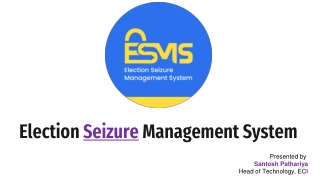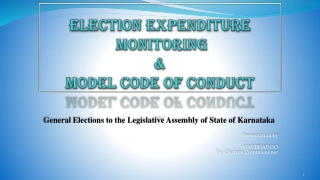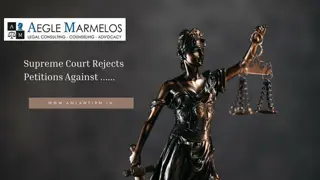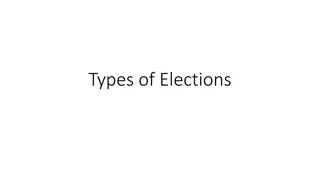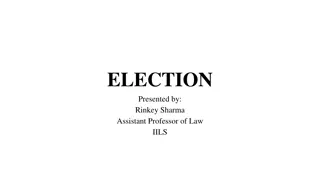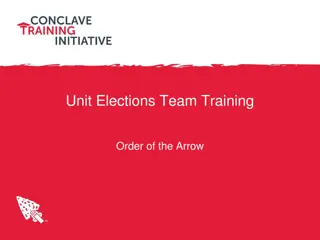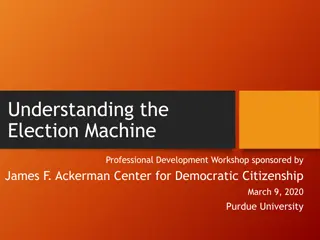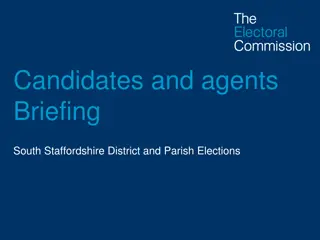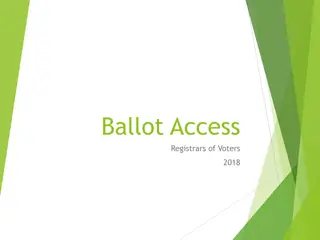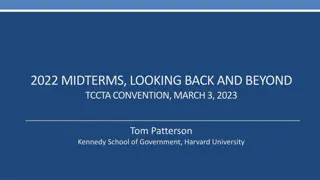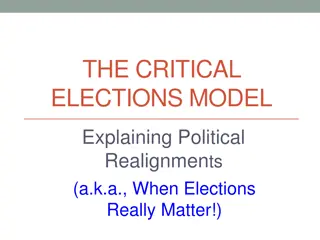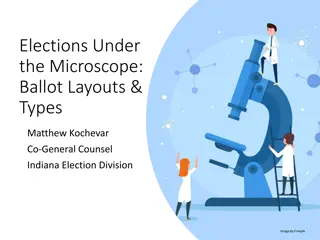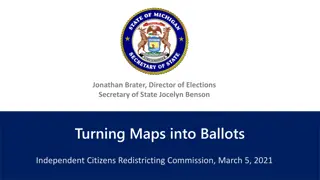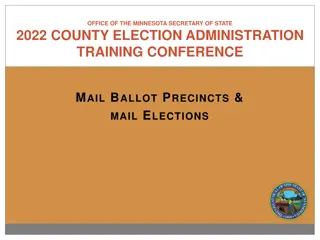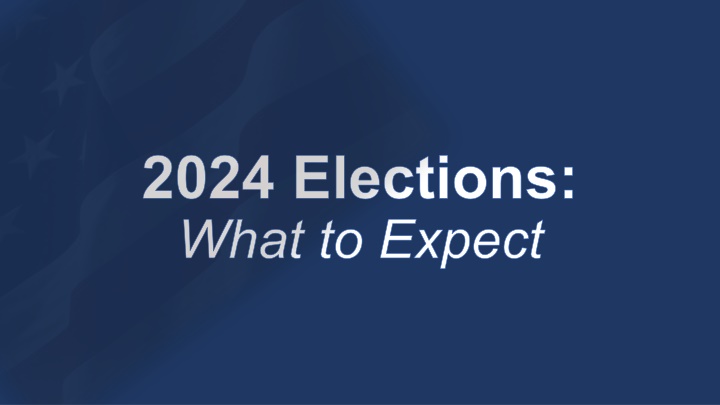
Insights into the Upcoming 2024 Elections: Primaries, Delegates, and Conventions
Delve into the intricacies of the 2024 elections, exploring the primary election process, delegate allocation, and national conventions for both Republican and Democratic parties. Understand the significance of delegates, the nomination threshold, and the role of superdelegates in securing the party's nomination. Discover the diverse rules governing primary elections across different states, from closed versus open primaries to caucuses versus primaries. Additionally, find out how to check your voter registration status and party affiliation through state election websites in Pennsylvania, New Jersey, and New York.
Download Presentation

Please find below an Image/Link to download the presentation.
The content on the website is provided AS IS for your information and personal use only. It may not be sold, licensed, or shared on other websites without obtaining consent from the author. If you encounter any issues during the download, it is possible that the publisher has removed the file from their server.
You are allowed to download the files provided on this website for personal or commercial use, subject to the condition that they are used lawfully. All files are the property of their respective owners.
The content on the website is provided AS IS for your information and personal use only. It may not be sold, licensed, or shared on other websites without obtaining consent from the author.
E N D
Presentation Transcript
2024 Elections: What to Expect
What are primaries? Parties use primary elections in the months prior to a general election to select the candidate that will run on behalf of the party during the general election NY Primary (presidential): Tuesday, April 2nd PA Primary: Tuesday, April 23rd NJ Primary: Tuesday, June 4th
How do primaries work? Based on the results of primary elections in each state, candidates receive a certain number of delegates (not votes, technically). Republican primaries: How many delegates depends on state In some states, winning the state means winning all of the state s delegates In other states, delegates are awarded proportionally Must win 1,215 delegates to secure nomination
How do primaries work? Democratic primaries: In all primaries, delegates are awarded proportionally Must win 1,968 delegates to secure nomination If no one receives a majority of pledged delegates on the first ballot at convention, superdelegates (unpledged) are allowed to vote on second ballot
How do primaries work? Candidates are formally nominated at parties national conventions during the summer before the election Republican National Convention (July 15-July 18, Milwaukee, WI) Democratic National Convention (August 19-August 22, Chicago, IL)
How do primaries work? Different states have different rules for their primary elections Closed v. Open primaries PA and NY have closed primaries NJ has partially open primaries Caucuses v. Primaries
Registration How do I find out if I am registered and/or which party I am registered with? State elections websites allow you to look up your voter registration status, which should include party affiliation PA: https://www.pavoterservices.pa.gov/pages/voterregistrationstatus.aspx NJ: https://voter.svrs.nj.gov/registration-check NY: https://voterlookup.elections.ny.gov/
Registration If I m not registered to vote, how do I register? In Pennsylvania You must be registered by 15 days prior to the election to vote You can register to vote online, by mail, or at a number of government agencies, including Pennsylvania Department of Transportation (PennDOT) Photo License and Driver s License Centers. https://www.vote.pa.gov/Register-to-Vote/Pages/default.aspx
Registration If I m not registered to vote, how do I register? In New York You must be registered by 10 days prior to the election to vote You can register online, by mail, or in person at your county board of elections, any New York State Agency-Based voter registration center, or the Department of Motor Vehicles. https://www.ny.gov/services/register-vote
Registration If I m not registered to vote, how do I register? In New Jersey You must be registered by 21 days prior to the election to vote You can register online or by completing a Voter Registration Application and/or Party Affiliation Form and mailing or delivering the form(s) to the County Commissioner of Registration or Superintendent of Elections for your county. https://www.nj.gov/state/elections/voter-registration.shtml
Registration I m living in PA temporarily because I m a student. Can I register and vote here? Yes. Here are the rules: You must be a resident of Pennsylvania and the election district in which you want to register and vote for at least 30 days before the next primary, special, municipal, or general election. If you are registering where you live while attending college in PA, you can use either an on-campus or off-campus address. You can only be registered in one place at a time. (Don t forget to change your registration when you graduate!!)
Voting How do I vote? PA: vote in-person at your polling place on election day OR by mail (anyone can vote by mail). https://www.pa.gov/guides/voting-and-elections/ NY: vote in-person at your polling place on election day OR by mail (anyone can submit their ballot early by mail) https://vote.nyc/page/how-vote NJ: vote in-person at an early voting polling place prior to the election, at your polling place on the day of the election, OR by mail (anyone can vote by mail). https://nj.gov/state/elections/vote-3-ways-to-vote.shtml
Voting How do I vote? How do I find my polling place? Once you are registered, you will receive information about where you should go to vote. Pay attention: you may receive last minute updates! Or, you can use online tools like https://www.vote.org/polling-place- locator/.
Voting What should I expect when I show up to a polling place to vote? The websites in the previous slides will give you information about the times when polling places are open You may need to wait in line. Even if polling closes while you are still in line, you still have the right to vote. They will stay open until everyone in line at the time of closing has voted. When you walk in, you ll need to check in with an election official. They ll look up your name and address to verify you are at the right place. You will sign your name to check in. If it s your first time voting, you ll need to show some kind of ID
Voting What should I expect when I show up to a polling place to vote? Every precinct, state, etc. may have different ways of voting. In some places you may be able to vote electronically using a machine. In many others, you ll be given a paper ballot, which you will fill out by (completely!) filling in ovals with a pen and inserting your ballot into a machine.
Voting What should I expect when I show up to a polling place to vote? If you mess up, you can request a new ballot. They will destroy your erroneous ballot. Once your vote has been submitted, either electronically or by inserting your paper ballot, the machine will confirm that your vote has been submitted. Bi-partisan teams of polling workers are there to help you. Do not be afraid to ask for help! It is their job!
Voting What if polling workers tell me I can t vote? If you believe you are registered, polling workers will call the County Board of Elections to verify you are registered. If they still cannot find your record, you should ask for a provisional ballot. This ballot will be submitted to be verified by the state. If it is verified, your vote will count. If they cannot verify it, your vote will not count. KNOW YOUR RIGHTS. No one is allowed to intimidate or coerce you at the polls. If someone is harassing you, call Election Protection at 866- OUR-VOTE
Voting When should we expect election results? Election results are covered by local and national media. While we may get some results on the night of the election, it is normal in close elections for results to take several days. Results will shift as urban areas are counted, mail-in vs. in-person ballots are counted, etc. Based on remaining possible votes for candidates, media may be able to call races prior to the end of vote counting. They are usually correct in their calls, but again they can make mistakes. This does not mean that the elections are corrupt.
Voting Should I be worried about elections being rigged? While a very small number of voters may vote fraudulently, American elections are very secure. The tiny amount of voter fraud that exists is not enough to shift the results of national elections.
Voting The Brennan Center s seminal report on this issue, The Truth About Voter Fraud, found that most reported incidents of voter fraud are actually traceable to other sources, such as clerical errors or bad data matching practices. The report reviewed elections that had been meticulously studied for voter fraud, and found incident rates between 0.0003 percent and 0.0025 percent. Given this tiny incident rate for voter impersonation fraud, it is more likely, the report noted, that an American will be struck by lightning than that he will impersonate another voter at the polls.
Important 2024 Dates: PA Primaries: April 8: Last day to REGISTER before the primary April 16: Last day to apply for a mail-in or civilian absentee ballot April 23rd: Last day for County Board of Elections to receive completed mail-in and civilian absentee ballots (must be received by 8:00 P.M.) April 23rd: PRIMARY ELECTION General: October 21st: Last day to REGISTER before the November election October 29th: Last day to apply for a mail-in or civilian absentee ballot November 5th: Last day for County Boards of Elections to receive completed mail-in and civilian absentee ballots (must be received by 8:00 P.M.) November 5th: GENERAL ELECTION
Important 2024 Dates: NY Primaries: March 23rd: Voter registration deadline March 23rd: Last day to request mail-in/absentee ballot April 2nd: Last day to return mail-in/absentee ballot (must be received by this date) April 2nd: PRESIDENTIAL PRIMARY ELECTION* General: October 26th: Voter Registration Deadline registration for General: Last day application must be received by board of elections to be eligible to vote in general election October 26th: Last day for board of elections to RECEIVE application or letter of application by mail or online portal for general election ballot. November 5th: Last day for County Boards of Elections to receive completed mail-in and civilian absentee ballots (must be received by 8:00 P.M.) November 5th: Last day to return mail-in/absentee ballot (must be received by this date) November 5th: GENERAL ELECTION *NY state has different primaries for the state vs. presidential elections
Important 2024 Dates: NJ Primaries: May 14th: Voter registration deadline May 28th: Last day to request mail-in/absentee ballot June 3rd (3:00 p.m.): Last day to return mail-in/absentee ballot (must be received by this date) June 4th: PRIMARY ELECTION General:* October 15th: Voter registration deadline October 29th: Last day to request mail-in/absentee ballot November 4th (3:00 p.m.): Last day to return mail-in/absentee ballot (must be received by this date) November 5th: GENERAL ELECTION *Tentative dates. Dates not officially released by state of NJ. Double-check over the Summer.

